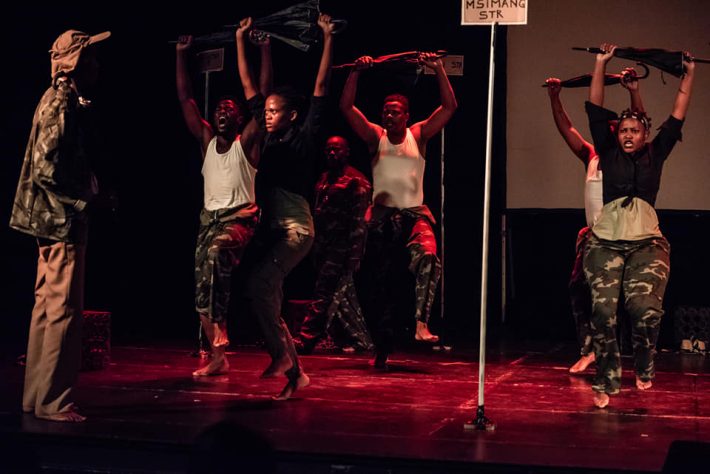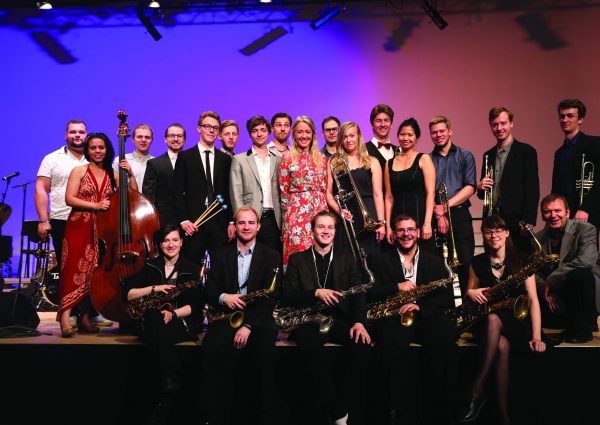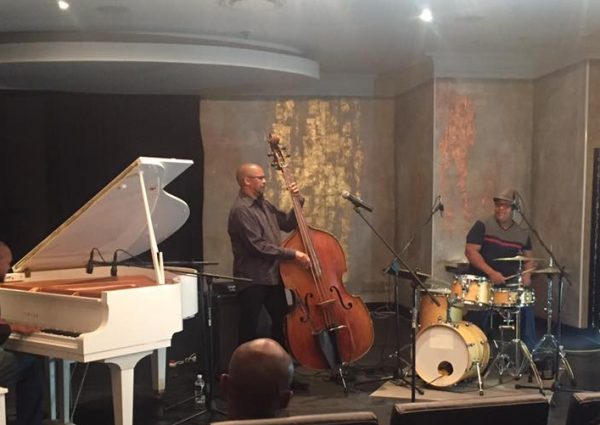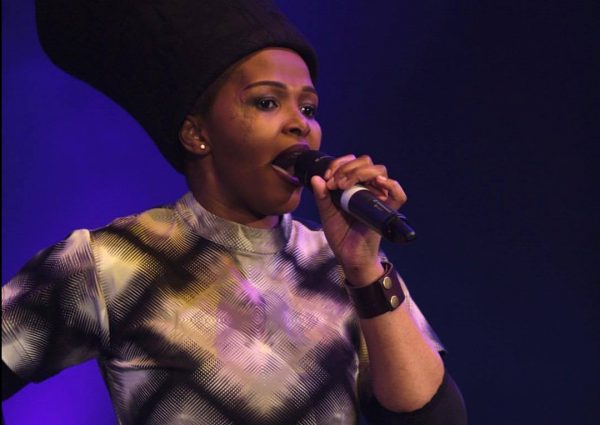iToyiToyi is a brilliant attempt to bring three artforms – Music, Poetry and Dance – into confrontation about their respective roles in the liberation struggle, and a tantalizing invitation to ponder on these and other ‘black expressions of pain and struggle’. It is however done a major disservice by its fetish to ground grand ideas into readily consumable granules – observes ART STATE publisher Mpho Matsitle.
Mad genius
I headed to the white elephant that is the Civic Theatre to catch the play, iToyiToyi: A Dance That Got Tired, with my anticipation straddling between dread and excitement. The latter because at face value, everything about the play warranted excitement: the director, Masedi Manenye, is the very definition of a mad genius. Having spent weeks with him in the trenches of Love, Crime & Johannesburg, ART STATE knows first hand how he marshals his troops to deliver magic over and over again. A core of his troops from LCJ – including music maestro Andile Qongqo – heeded his call to join him in dancing the freedom drill.
Dancing the freedom drill
A question needs to be asked of Manenye as to his obsession with the triple threat of music, drama and dance in his works. With history as an overriding theme. His last three major productions – Sophiatown, Love, Crime & Johannesburg, and iToyiToyi – all adhere to this structure and motif with almost a stifling rigidity. As a performance art practitioner and academic, one can be deadsure that none of this is mere coincidence. The thread of history in the three plays too is very specific; it is the history of freedom. Of how we flung ourselves against tyranny and sung our way out of misery. Which is why I was overcome with dread when I perchance happened upon a ‘preview’ (if we are to take liberties with the word) in the local paper. The weekly rag would have me convinced that in iToyiToyi, Masedi meant to bring to stage the staid liberal critique of the masses that take to the streets in dance to register discontent with their being excluded from the fruits of freedom. This the toyi toyi dance is, as per scholar Ziyana Lategan, “the most common form of registering political dissatisfaction with the democratic order because democratic institutions are neither available to, nor effective for, the demands made by black people.” It is common cause among straight-thinking people that no one can ever prescribe to the oppressed how they should express their dissatisfaction (pace Biko and his tips on kickboxing). Had Masedi abandoned the ranks of the straight-thinking? As it has unfortunately become norm, all I read in that paper was, fortunately, fake news. The play sought to map the coordinates of black forms of expression.
Forms of expression
Where iToyiToyi parts ways with its predecessors is in form. The two previous plays concern themselves, in form and content, with the struggle of corporeal people. That is; the characters are people dealing with people issues. iToyiToyi deals with issues of the people, but its characters are not people. Rather, they’re forms of expression. What the character Poetry (Boitumelo Mohutsioa) aptly called “black expressions of pain and struggle” in her heated exchange with Music (Tshireletso Nkoane). Joining these two expressions on stage is dance, represented by the play’s titular (but not main) character Toyi Toyi (Mbuyiselo Nqodi) and the tripartite of Matorokisi (John Paka), Vosho (Mlungisi Tshobeka) and Marabi (Lehlohonolo Tlhabanelo).
"We left your movement with bitter hearts!" Matorokisi shuns Poetry's advances. Credit: Mudboots Photography.
Although each character represents a form of expression, none is tasked with any exclusively. The music, comprised of struggle songs with a smidgen of gospel, is spot on a black expression of pain and struggle. Albeit narrow in the sense of excluding jazz, isicathamiya, choral, and other genres pivotal in bringing down the walls of Jericho. The music, however, was exquisitely delivered. Tlhabanelo and Paka especially stood out, their baritone often providing a magnificent canvass for the different characters’ soliloquies. And maigot!, how about that moment of sheer brilliance where Tlhabanelo surreptitiously code-switched a struggle song into marabi? Music always wins!
The other two forms suffered all of the music’s limitations without any of its redeeming features. Apart from Marabi’s moment of genius described above, and the rather stillborn attempts of Selby Msimang (Kabi Thulo) and young Music (Lesedi Manenye) at contemporary dance, the dancing in the play was mostly uninspired variations of the toyi-toyi. Nowhere did the jive feature, not a single sole tapped, nor were we shown how the gumboot-turned-drum stomped down Babylon. Not even the vosho, twerk or matorokisi dances were given space under the sun to shine.
Despite Mohutsioa’s brilliant delivery, the poetry was simply unimaginative, taciturn and unstylish – testament to the shoddy state of Mangaung poetry. The writers, in an ironic Freudian slip, apparently admit to this when they have an angry Music dismissively shout, “I don’t give a stanza whether it’s poetic or not!” One wonders how many of the chuckles that followed that line were esoteric. One finds no influences of the choruses of Ingoapele Madingoane, the scamtho quick-stepping of Isabella Motadinyana, nor the amnesia erasing words of Koleka Putuma.
Their individual limitations notwithstanding, in unison the three artforms superbly delivered a wonderful show, and what could possibly be a grand piece of artwork if not for its debilitating grounding fetish.
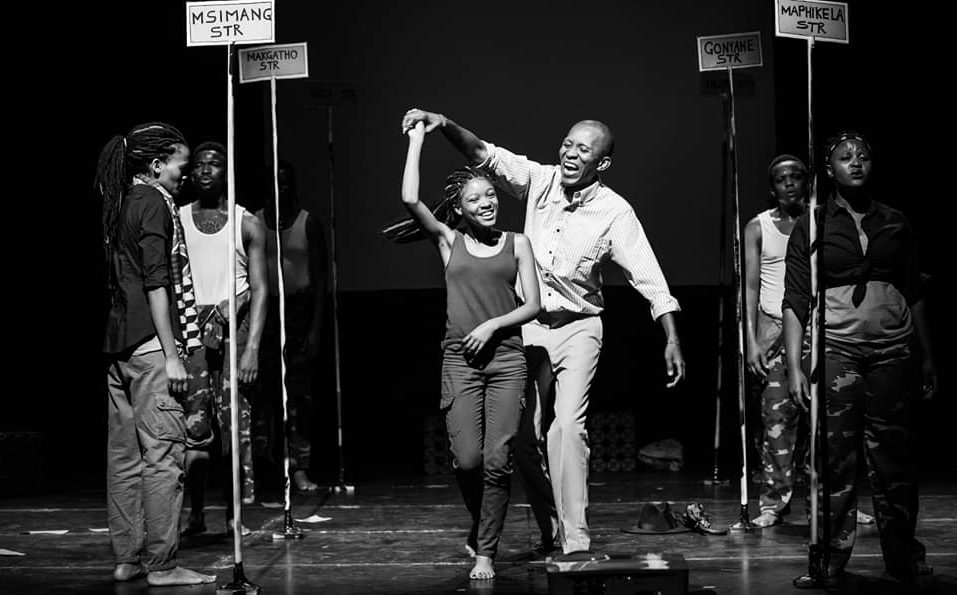 Music dances with her grandfather. Credit: Mudboots Photography.
Music dances with her grandfather. Credit: Mudboots Photography.Grounding fetish
These expressions of black pain are engaged in a battle for the soul of the Dancing Party. Toyi Toyi is the president of this party, and it is general consensus that he cannot deliver anymore. An assertion he too seems to agree with, as evinced by his repeated laments of being tired per the play’s subtitle. His successor is Music, who fatally calls on the party to ‘return to God’. Vosho and Matorokisi would have none of it; the former goes to join the Twerking Party – and vows to remain loyal to “makgoa a ka” – where he inherits a blue tie. Whereas Matorokisi goes to form his own party, the double-barrelled Grumping/FF Party, and dons the red cap. As soon as Music takes over, Poetry starts plotting against her – despite the fact that Music is more than willing to hand over the reins to Poetry to be the new “chief messenger of the revolution.”
All of this sounds a tad too familiar. From hereon one can already guess where the story comes from and where it goes; from Polokwane 2007, via the Metros 2016, to Nasrec 2017, and clairvoyantly all the way to the 2023 general election as the infographic displayed on the background screen suggests. In this way iToyiToyi abandons its grander and more abstract attempts at cartography of how our ‘black expressions of pain and struggle’ were formed and formed us – attempts that are admittedly unstated but rather become apparent in the grammatical slippages of the play. The production thus becomes nothing more than an absolutely entertaining internal memo of the African National Congress ahead of its upcoming National General Council. It is a futile attempt to retrieve “the broken pieces of a whole” as old man Msimang warns his granddaughter Music as she vows to “the restoration of our movement.”
This desperation to ground grand ideas into consumable granules reveals a lot about our zeitgeist. Artists, who by nature ‘live in the clouds’, are constantly pressured to ‘come to the ground’ – to limit their imagination to ‘reality’. Or worse still, as per novelist Fortunate Jwara, artists “are not willing to break boundaries and shock” the audiences, they want to “beg them and feed them pleasing mediocre to their not-stretched imaginations.”
In an age where ‘reality TV’ increasingly upstages fiction and imagination, artists are forced to ‘keep it real’. The pressures of the ‘market’ equally play a stifling role; people want to buy what they can immediately grasp or relate to – or so we are told, and the powers that be will not sign off anything too ‘lofty’ or ‘highbrowed’. The result of these efforts is anthropological theatre. Playwrights become journalists, and drama becomes nothing more than reenactment in a documentary. But this fetish for ‘keeping it real’ serves neither the art, artists nor audience. Philosopher Slavoj Žižek warns that, “As soon as we renounce fiction and illusion, we lose reality itself; the moment we subtract fictions from reality, reality itself loses its discursive-logical consistency.” We need fiction to understand, to make sense of, reality. And this is the reason why throughout known history all peoples have produced fictions (artistic, political, religious, etc.).
#IAmStaying - Vosho will not be lured back to the Dancing Party. Credit: Mudboots Photography.
There is also a level of self-evident snobbery exposed by this rush to bring art ‘down to the level of the people’. It is the assumption that audiences are too stupid to understand – even with constant exposure – artistic or abstract concepts that do not immediately resemble their lived experiences. It is this nervousness, for example, that saw iToyiToyi make Matorokisi an overly on the nose caricature of Sello Malema, to the point of quoting his infamous ‘bastard’ phrase verbatim. How – why even – did the writers arrive at the conclusion that we didn’t get the point when Matorokisi defected from the Dancing Party and donned the red cap? Or why they appended the unexplained ‘FF’ to the name of his party?
Another danger found on the ground is loss of artistic licence. When the playwright turns journalist, the questions that arise are no longer of aesthetics but of authority, objectivity, and accuracy. When Poetry tries to rally the defectors Matorokisi and Vosho in her bid to oust music, they dismiss her with the chorus “we left your movement with bitter hearts.” Because the play has laboured so much to make Matorokisi qua Malema, add to this the party Matorokisi represents is literally called “the grumping party”, the members of the Economic Freedom Fighters would be well within their rights to question the ANC-biased notion that they are just a little more than ‘bitterists’.
The greatest loss in this fire on the ground is of course illusion and fiction. We go to the theatre – to art – for high drama to escape our prosaic lives. When we part with our rands, all we ask in return is something bigger than life itself, not mere mimicry of life. We ask of the artists to reveal their and our (sometimes hidden) dreams, imaginations, and fantasies. We demand characters; fantastical unbelievable incredible absurd superfluous pieces of shit that we will love to hate and hate to love. Art is Alexander Pushkin’s “deception that elevates us.”
iToyiToyi threatened to give us all of that and more. The exchange between Poetry and Music, in what was the plays’ Kiss at Gethsemane, is one such threat. Poetry’s paean to Music is that she has been the “antidote to our pain and suffering”, and Music for her part implores Poetry to “counsel the children…do not abandon the revolution.” The youngin protests; “Ba tlhogo di thata Music!” The elder stateswoman has no stomach for excuses; “Di dire bonolo Poetry!” This exchange, left in the air, opens up a multitude avenues of inquiry: Does poetry really have music’s character? Do all art “carry the burden of the revolution”? What is the relationship between music and poetry? Can/should today’s poets carry the baton of yesteryear’s musicians?
These elevating possibilities, these excursions at inquiry, are closed out immediately once this brilliant imaginative artwork is grounded to real factional battles of the ANC. And by that we are reduced to pondering on Pushkin’s “host of low truths” like whether Matamela Ramaphosa will survive the NGC. Excusing these lapses, the elevating aspects of iToyiToyi also have me wondering about its missing trinity.
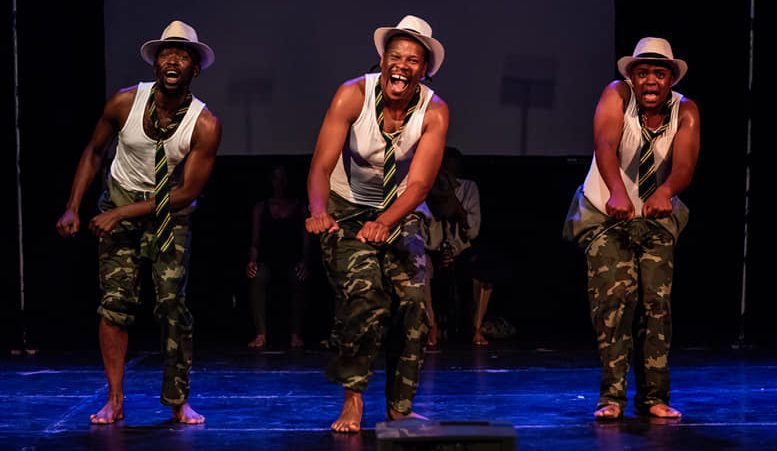 Dream team: Rhetoric, Literature, and Theatre. Credit: Mudboots Photography.
Dream team: Rhetoric, Literature, and Theatre. Credit: Mudboots Photography.Missing trinity
Tshiamo Malatji has already alluded to the underutilisation of Toyi Toyi in the play. I would like to wager he alone could have carried the baton to represent dance in the play. That way, the other three thespians could have represented other prominent ‘black expressions of pain and struggle’: Rhetoric, Literature, and – most excitedly – Theatre.
When the young lions roared all the way into the jungles of Africa in search of sure death, singing Sobashiya Abazali, were they nor roused by Rolihlahla Mandela’s I Am Prepared To Die speech delivered at the dock? From yet another dock, didn’t Bantu Biko’s rope-a-dope, where the cheeky native essentially told the white judiciary ‘ke le batla one by one’ – did that not spark the June 16 revolt? Who can forget Nomzamo Mandela’s gambit; “Together, hand in hand, with our matches and our necklaces, we shall liberate this country”? Or her teenage daughter delivering scathing judgement on the white power structure in a packed stadium? It was all rhetorical! Our people have always had the gift of the gab, and by God did they employ it in the fight against dehumanization. “This is Radio Freedom!”
The mastery of words didn’t just end on the podium and pulpit, it found its way to print. We beat the drum as we stuffrode our way out of the bantu world to freedom. All the organizations in the liberation movement had magazines and newspapers. Pamphlets littered the streets of occupied Azania. The novelists were intellectual klipgoiers – furiously slinging their pens at Goliath. At many points the pen proved mightier than the sword. The freedom writers, the liberating literati, how good it would be to see them on stage. “I Write What I Like.”
Oh and the stages! Filled with bellowing words and worlds, charging music and the very rhythm of time. The elaborate costumes that pranced the theatres – from golden lion manes to black dungarees. “Freedom is coming tomorrow!”
How these three – Rhetoric, Literature and Theatre – will be presented on stage as singular characters is an exciting proposition. No less exciting than what iToyiToyi has already attempted with Music, Poetry and Dance. Now the six of them all together on one stage, divorced from ‘reality’, with the mad genius of Masedi pulling the strings, Qongqo striking the keys, and the talented cast that graced the Civic and Jika theatre stages last month end – now that is the stuff dreams are made of. I am eternally grateful for the dreams iToyiToyi inspires, and the pitfalls it warns of.
Mpho Matsitle’s rallies against many other things at mphomatsitle.co.za.
FEATURED IMAGE: Dancing the freedom drill. Credit: Mudboots Photography.

